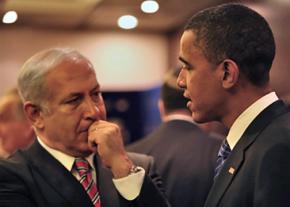Are the Democrats turning on Israel?
The right wing's claim that Barack Obama and the Democrats are "anti-Israel" flies in the face of the evidence--particularly the kind with dollar signs on it, writes .
WITH THE sun setting on Barack Obama's time in the White House, commentators are starting to assess the mark he will leave on foreign policy generally and the U.S. relationship with Israel in particular.
These assessments are taking place against the backdrop of an acrimonious debate in the run-up to the Democratic National Convention about what the party's platform will say about the Israel-Palestine conflict.
Cornel West is among a group of Bernie Sanders supporters who have made an impassioned case to use the word "occupation" to describe Israel's treatment of Palestinians. This is a welcome break from the Democrats' usual no-exceptions defense of every last atrocity committed by Israel against Palestinian people and society.
Yet despite the many journalistic reports of the deep, personal rift between Barack Obama and Israeli Prime Minister Benjamin Netanyahu, the integrity of the U.S.-Israel "special relationship" appears as robust as ever.
One way to measure this is the Obama administration's enduring fiscal generosity toward the apartheid state.

The White House increased the amount of annual aid given to Israel by about 10 percent compared to the George W. Bush administration--rising to more than $3 billion annually. And in April, the administration announced a proposed 10-year aid package that would increase U.S. aid to Israel by roughly one-third to $40 billion over the decade-long period, a sum widely trumpeted as the largest single pledge of military assistance to any country in U.S. history.
Yet Netanyahu has yet to formally accept the proposal, reportedly because he is angling for $5 billion a year in aid to Israel.
Or maybe he merely sees another opportunity to snub Obama, given that in February Netanyahu raised the possibility of waiting for the next U.S. president to take office before concluding a deal on the aid package.
THE TERMS of the personal antagonism between Obama and Netanyahu actually reflect a strategic debate running through both the American and Israeli political establishments.
While Netanyahu regards Obama as dangerously naïve about the geopolitical challenges facing Israel and the U.S. in the Middle East, Obama thinks Netanyahu's enthusiasm for stepped-up military confrontation with Iran and his repeated assaults on Gaza are counterproductive to the goal of ensuring Israeli security.
These strategic differences came to a head in the debate over the U.S.-Iran nuclear agreement announced last fall. The deal was bitterly condemned by "hard-liners" in both the U.S. and Israel. Yet, as is the case in debates that are strategic rather than partisan, various Democrats, such as Sen. Chuck Schumer (D-N.Y.), joined the Republican side, and various Israeli security experts backed Obama.
For his part, Obama stressed that the deal included provisions allowing for unilateral U.S. military action if Iran broke the terms of the agreement. "If Iran violates the agreement over the next decade, all of the sanctions can snap back into place," said Obama. "We won't need the support of other members of the UN Security Council; America can trigger snapback on our own." The president's stress was that the use of military force was one option available to U.S. foreign policymakers.
The personal acrimony between Netanyahu and Obama has overshadowed the strategic differences, for which each serves as a mouthpiece.
It's worth remembering that the two heads of state took office just months apart, and that Netanyahu endorsed Obama's opponent Mitt Romney in the 2012 election, despite the fact that Obama pledged his support for an "undivided Jerusalem" as the "capital of Israel" while he was on the campaign trail and during his early years in office--a position that many in Israel don't even embrace.
As Hillary Clinton marches on toward the Democratic nomination, the right's attacks on her and the Democratic Party as "anti-Israel," "weak on Iran" and "soft on terror" are one more expression of a debate between "right" and the "left" in U.S. politics that hides underlying agreement.
The counter to the focus on the conflict is to look at the Obama administration's record aid package to Israel, Obama's bellicose statements about Iran, and the administration's willingness to work with Russia in stepping up its military engagement in Syria.
None of that is to deny that it's possible to find an expression of growing public criticism of Israeli policy on the margins of the Democratic Party.
But this is due more to the sustained pressure from the boycott, divestment and sanctions movement than a fundamental rethink of U.S. commitment to Israel--on the part of either the foreign policy establishment or the Democratic Party.


